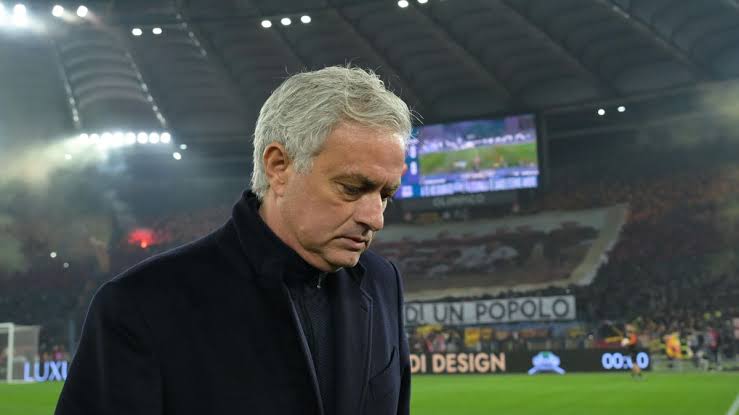Stephen Dunmoye
Roma’s decision to sack Jose Mourinho was taken by club owners the Friedkin family late Monday and communicated to the manager and the world, which had turned a far greater spotlight on the club since his arrival in 2021 before training on Tuesday morning.
Meanwhile, his contract would expire in June and, while he had repeatedly indicated that he was happy to extend it, the club had put all discussion on hold until the end of the season.
The reality is that Mourinho wasn’t sacked because he had lost the dressing room or because fans were calling for his head while support for him had cooled among portions of the fan base, especially on social media and Rome’s omnipresent sports radio stations, the match-going supporters squarely (and noisily) continued to back him.
Rather, he’s gone because the Friedkins are businessmen, and they made a business decision.
According to Swiss Ramble, Roma lost €184 million ($200m) in 2020-21 and €219m ($238.1m) the following year, Mourinho’s first at the club. The record losses in 2021-22, when they were among the biggest net spenders on transfers in Europe, meant they breached UEFA’s Financial Fair Play regulations and were put under a settlement agreement, which restricted their spending.
Effectively, the club had gambled that investing heavily on the squad (initially on transfer fees, later in pricey veteran free agents, giving the club the third highest wage bill in the league) and on Mourinho himself (the second-highest-paid manager in Serie A) would deliver consistent Champions League football. That, in turn, would drive revenue, both in terms of prize money and commercial deals. Instead, they finished sixth in his first two seasons while winning the UEFA Europa Conference League in 2021-22 and reaching the Europa League final the following year.
Now, Roma are ninth in Serie A, five points away from fourth place. They are out of the Coppa Italia (losing the derby to Lazio, which never helps) and have won just one of five games since Christmas, a comeback victory against Serie B side Cremonese in the Coppa Italia.
To salvage this campaign Roma need to qualify for the Champions League. They can do that either by winning the Europa League (not easy: oddsmakers have them as sixth favorites, at 16-1) or closing the five-point gap with fourth place (and, given the new Champions League format, fifth place might even be sufficient.)
Maybe Mourinho could have gotten it done, but then that would have presented a different issue. Since his contract was expiring and they weren’t going to discuss a new one until the end of the season, it would have meant negotiating a new deal with Mourinho enjoying all the leverage of Champions League qualification. And that would have meant either an even-more onerous contract (both in terms of wages and power to the manager) or Mourinho going elsewhere, leaving behind him no compensation and an enraged fan base.
Best to play the percentages, then, and make a clean break. Club legend Daniele De Rossi steps in as interim replacement and, given his relationship with the fan base, you would assume he will get their support. For all the criticism Mourinho’s results-orientated and not-easy-on-the-eye style of play has garnered, they’re actually fourth in expected goal difference and they have a pretty manageable run of fixtures coming up: Verona and Cagliari at home, Salernitana away. So the task facing De Rossi is tough, but far from impossible.
Here, you can pick and choose based on whether you like him. He reached two European finals, winning one. True, but then his 1.61 points-per-game average in Serie A is the lowest of any Roma manager in the past 39 years. And he was heading for three straight seasons finishing outside of the top five in the league, the club’s worst run in three years.
Roma might have spent a lot to support Mourinho in his first season, but in subsequent windows the club transferred a lot of players out, leaving a positive net spend of €130m. True, but that’s because they breached FFP and had to balance the books, remember? And even then, he chose to have the club ship out younger players who could fetch a transfer fee (Cengiz Ünder, Pau López, Nicolò Zaniolo, Felix Afena-Gyan, Roger Ibañez, Justin Kluivert) in order to replace them with veterans on high salaries, which is why the wage bill was so high: (Romelu Lukaku, Renato Sanches, Leandro Paredes, Paulo Dybala, Nemanja Matic, Gini Wijnaldum, Andrea Belotti.)
Roma’s sporting director, Mourinho’s countryman, Tiago Pinto, generally helped him execute that transfer strategy, as did his agent, Jorge Mendes, who was involved in a number of the club’s deals. Mourinho knew what he was getting into, what the financial restraints were going to be and what the budgets were going to be and he was on board with it, just as long as he got to dictate the transfer strategy, which he did, with help from his trusted friends.

